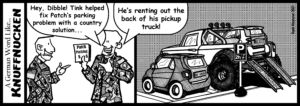
By Ch. (Lt. Col.) Joshua Gilliam
HQ EUCOM ECCH Assistant Command Chaplain
In a previous assignment another chaplain and I were in the garrison commander’s office to discuss our proposal for a new chapel start. The conversation was cordial — and even promising — until the commander finally said, “I believe our current chapel offerings are sufficient. Besides, I need you focused on counseling Soldiers struggling with alcoholism rather than chapels.”
Surprised she viewed chapels as meeting a requirement rather than optimizing readiness, I responded, “If you use your chaplains primarily as counselors, you underutilize the resource. Chaplains provide commanders a competency that no one else does — building religious communities. Rather than one person — the chaplain — helping one other person (counseling), religious communities can create an environment where 100 people are equipped to help a 1,000.”
Participation in religious communities is the forgotten factor in building the resilience that leads to readiness. According to Dr. VanderWeele of the Harvard School for Public Health, religious participation is the single most protective activity one can be involved in. Throughout history churches, synagogues, mosques, and other places of worship have provided people social and spiritual connections in ways Facebook will never be able.
Creating and leading these religious communities is the core competency chaplains provide commanders. Yet, commanders do not always see this potential. A commander would never be content with his surgeon visiting training for the majority of each day. The doctor better set up a clinic and see patients. A commander would never be happy with his JAG running the unit intramural league and doing a “Thought of the day” in Command & Staff. The lawyer better practice law. Yet, commanders sometimes do not expect their chaplain to provide the very competency they had to establish before accessioning – that is, lead a religious community. In fact, the ability to do this was regarded so highly in generations past, that the instruction to “hold appropriate religious services” is the one duty given to chaplains in the US Code.
The political correctness of religious participation changes with administrations, but our Soldier’s need for authentic community is innate. With the proliferation of social media, the loss of the day rooms, single-unit living quarters, underutilized dining facilities, and work environments that are increasingly compartmentalized and electronic, the need for a resurgence in religious communities in our army has never been greater. And I haven’t even started to discuss COVID…
But this article is not just aimed at leaders. How about you? Are you protecting yourself and your family? Are you part of a religious community?
